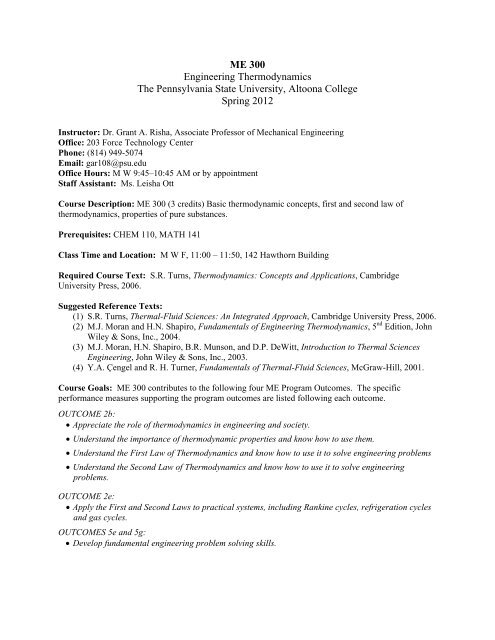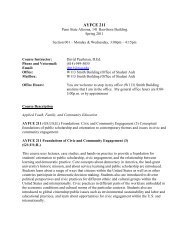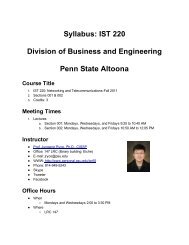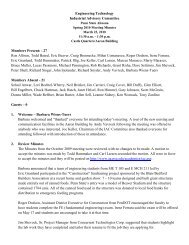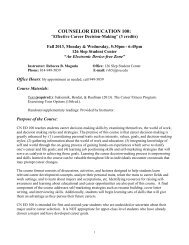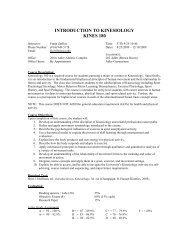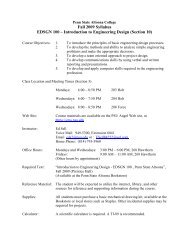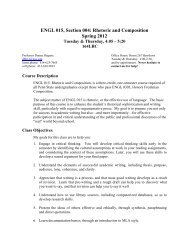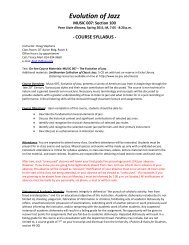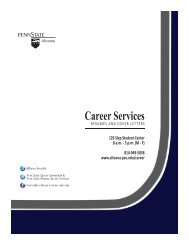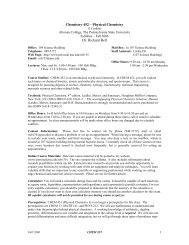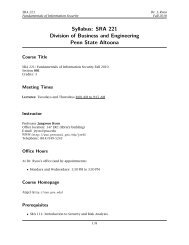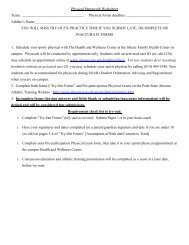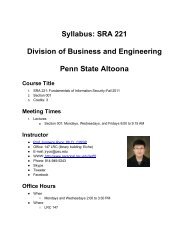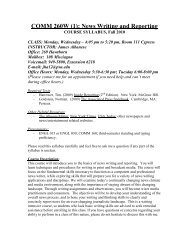M E 300 - Penn State Altoona
M E 300 - Penn State Altoona
M E 300 - Penn State Altoona
- No tags were found...
Create successful ePaper yourself
Turn your PDF publications into a flip-book with our unique Google optimized e-Paper software.
ME <strong>300</strong>Engineering ThermodynamicsThe <strong>Penn</strong>sylvania <strong>State</strong> University, <strong>Altoona</strong> CollegeSpring 2012Instructor: Dr. Grant A. Risha, Associate Professor of Mechanical EngineeringOffice: 203 Force Technology CenterPhone: (814) 949-5074Email: gar108@psu.eduOffice Hours: M W 9:45–10:45 AM or by appointmentStaff Assistant: Ms. Leisha OttCourse Description: ME <strong>300</strong> (3 credits) Basic thermodynamic concepts, first and second law ofthermodynamics, properties of pure substances.Prerequisites: CHEM 110, MATH 141Class Time and Location: M W F, 11:00 – 11:50, 142 Hawthorn BuildingRequired Course Text: S.R. Turns, Thermodynamics: Concepts and Applications, CambridgeUniversity Press, 2006.Suggested Reference Texts:(1) S.R. Turns, Thermal-Fluid Sciences: An Integrated Approach, Cambridge University Press, 2006.(2) M.J. Moran and H.N. Shapiro, Fundamentals of Engineering Thermodynamics, 5 nd Edition, JohnWiley & Sons, Inc., 2004.(3) M.J. Moran, H.N. Shapiro, B.R. Munson, and D.P. DeWitt, Introduction to Thermal SciencesEngineering, John Wiley & Sons, Inc., 2003.(4) Y.A. Çengel and R. H. Turner, Fundamentals of Thermal-Fluid Sciences, McGraw-Hill, 2001.Course Goals: ME <strong>300</strong> contributes to the following four ME Program Outcomes. The specificperformance measures supporting the program outcomes are listed following each outcome.OUTCOME 2b: Appreciate the role of thermodynamics in engineering and society. Understand the importance of thermodynamic properties and know how to use them. Understand the First Law of Thermodynamics and know how to use it to solve engineering problems Understand the Second Law of Thermodynamics and know how to use it to solve engineeringproblems.OUTCOME 2e: Apply the First and Second Laws to practical systems, including Rankine cycles, refrigeration cyclesand gas cycles.OUTCOMES 5e and 5g: Develop fundamental engineering problem solving skills.
Instructor’s Mission: My mission is to aide students in learning and motivate them to become premiereengineers, scientists, and engineering technologists. My duty is to teach the student problem solvingskills and provide them with the proper skillset and required tools for which he/she will be successfulbeyond this class and beyond graduation. My interest lies with the learning process of the student and tomake the course interesting and enjoyable. I want to be approachable and available. Therefore, I stronglyencourage students not to hesitate to come to my office if they are struggling in this class or any otherclass. Please come if you are doing well, too.Course Attendance: Class attendance is strongly encouraged.Academic Integrity: Academic integrity is the pursuit of scholarly activity in an open, honest andresponsible manner. Academic integrity is a basic guiding principle for all academic activity at The<strong>Penn</strong>sylvania <strong>State</strong> University, and all members of the University community are expected to act inaccordance with this principle. Consistent with this expectation, the University's Code of Conduct statesthat all students should act with personal integrity, respect other students' dignity, rights and property, andhelp create and maintain an environment in which all can succeed through the fruits of their efforts.Academic integrity includes a commitment not to engage in or tolerate acts of falsification,misrepresentation or deception. Such acts of dishonesty violate the fundamental ethical principles of theUniversity community and compromise the worth of work completed by others. The instructor mayassign an academic sanction ranging from a warning, to failure on an assignment or in the course, or toremoval from the course. (Policies and Rules for Students, Section 49-20, and Academic IntegrityProcedure G-9.)Students with Disabilities: <strong>Penn</strong> <strong>State</strong> welcomes students with disabilities into its educational programs.If you have a disability-related need for modifications or reasonable accommodations in this course,please contact the Health & Wellness Center, Disability Services, located in the Sheetz Family HealthCenter. For more information, call (814) 949-5540 or visit the Disability Services web site atwww.altoona.psu.edu/healthwellness. Your instructors should be notified as early in the semester aspossible regarding the need for modifications or reasonable accommodations.Homework Format: Submit homework on engineering or notebook paper with no tears. Also, only useONE side. Problems on the backside will not be graded. Please include the homework cover page andwhere applicable follow the handout with the homework format for engineering problems. Theprescribed format strengthens logical methodology and systematic analyses for solving engineeringproblems. At least ONE randomly chosen problem of the assigned homework problems will be graded.Course Website: The course website is in the ANGEL (www.angel.psu.edu) system. Please verify thatthe email address listed in the Angel website is the one that you regularly use. The course website will beused to post assigned homework, homework solutions, announcements, and other additional informationpertaining to the course.Make-Up Exams and Homework: There will not be any make-up exams, quizzes, or homework unlessabsolutely necessary and must have the instructor’s approval prior to the exam, quiz, or homework andmust follow university policies.Class Cancellation: In the event that snow or other inclement weather forces a delay or a closing of thecampus, class may be cancelled and a notice will be posted on <strong>Penn</strong> <strong>State</strong> <strong>Altoona</strong>’s Website(www.aa.psu.edu). Additionally, for other foreseen or unforeseen class cancellations, notification will beposted on the class website or an email will be sent out to students in the class. You may also contact meby phone whether or not class is indeed cancelled.
Grading: The following breakdown is the tentative percentage distribution the semester. There will betwo mid-term exams, 7-9 quizzes, and a comprehensive final exam. Your lowest quiz score will bedropped, accounting for 16% of your grade. There will be 7-9 homeworks assigned and the two lowestscores will be dropped, constituting 16% of your overall grade. No homework will be accepted late. Atleast one problem will be graded and returned. Scheduled mid-term examinations will contribute to 48%of your grade in this course. Exam problems may consist of short answer, fill in the blank, and/orproblem solving. A comprehensive final exam, during finals week, will count for the remaining 20%.FINAL EXAM conflicts must be filed in advance according to university policies. Also, it is possiblethat mid-term exams and the final exam may be conducted at a common time for both sections.Midterm Exams (3) 48%Quizzes 16%Homework 16%Final Exam 20%BE ADVISED THAT ME <strong>300</strong> IS A C-REQUIREMENT COURSE. A MINIMUM GRADE OF C ISREQUIRED FOR THE COURSE FOR YOUR BACCALAUREATE DEGREE PROGRAM.Tentative Class Schedule: The following table consists of a tentative course schedule for the semester,some dates may change.Class # Date Topic Description Reading Due1 Jan 9 (Mon) course introduction and preliminaries 1.1-1.22 Jan 11 (Wed)physical framework, types of systems, conservationprincipals1.3-1.43 Jan 13 (Fri) definition of properties, states, cycles, equilibrium 1.5Jan 16 (Mon)Martin Luther King Day – NO CLASS4 Jan 18 (Wed) dimensions; units; problem solving methodology 1.6-1.8 QUIZ#15 Jan 20 (Fri) common thermodynamic properties 2.1-2.2 HW#16 Jan 23 (Mon) calorific equation of state, enthalpy, specific heat ratios 2.2b7 Jan 25 (Wed) state principal; equation of state, entropy 2.3-2.48 Jan 27 (Fri) Gibbs free energy, ideal gas law 2.4d QUIZ #29 Jan 30 (Mon) P-v-T relationships, phases, quality 2.5 HW#210 Feb 1 (Wed) pure substances; P-v; T-v diagrams 2.611 Feb 3 (Fri) EXAM #112 Feb 6 (Mon) multiphase substances; phase boundaries; compressibility 2.713 Feb 8 (Wed)Letter Grade ScoreA 93-100A- 90-92B+ 87-89B 84-86B- 80-83C+ 76-79C 70-75D 60-69F < 60multiphase substances (cont’d); linear interpolation; inclassproperty exercise2.8
Class # Date Topic Description Reading Due14 Feb 10 (Fri) conservation of mass: closed systems 3.1-3.2 HW#315 Feb 13 (Mon) conservation of mass: open systems 3.3-3.3e16 Feb 15 (Wed) mass conservation analysis: open and closed systems QUIZ#317 Feb 17 (Fri) energy storage, heat and work interactions 4.1-4.318 Feb 20 (Mon) identifying energy transfer via work interactions 4.3-4.519 Feb 22 (Wed) energy transfer via heat; conservation of energy 5.120 Feb 24 (Fri) conservation of energy: closed and open systems 5.2a-5.3b QUIZ#421 Feb 27 (Mon) one dimensional flow; energy rate balances HW#422 Feb 29 (Wed) EXAM #223 Mar 2 (Fri) steady flow processes and devices 7.2-7.3Mar 5 (Mon)Mar 7 (Wed)Mar 9 (Fri)SPRING BREAK-NO CLASS24 Mar 12 (Mon) steady flow devices: pumps, compressors 7.4-7.525 Mar 14 (Wed) steady flow devices: fans and turbines26 Mar 16 (Fri) heat exchangers 7.627 Mar 19 (Mon) 2 nd Law of thermodynamics; Kelvin-Planck 6.1-2 QUIZ#528 Mar 21 (Wed)coefficient of performance for heat pumps andrefrigerators; reversibility and irreversibility6.3-6.4a29 Mar 23 (Fri) reversible cycles; Carnot cycle; Carnot efficiency 6.4b-6.6a30 Mar 26 (Mon) reversible cycles, entropy balances; 2 nd Law statements 6.4cHW#531 Mar 28 (Wed) Entropy; 2 nd law property relationships 6.6-6.6c QUIZ#632 Mar 30 (Fri) T-s relationships for ideal gases; isentropic air tables 2.4e-2.4h33 Apr 2 (Mon)isentropic and polytropic processes, isentropicefficiencies; T-s diagrams6.6e, 7.4b,7.5b34 Apr 4 (Wed) isentropic processes and system analysis HW#635 Apr 6 (Fri) power systems: Rankine cycle; steam power plant 8.1a36 Apr 9 (Mon) EXAM#337 Apr 11 (Wed) Rankine cycle analysis38 Apr 13 (Fri) superheat and reheat 8.1b39 Apr 16 (Mon) steam power plant regeneration 8.1c QUIZ#740 Apr 18 (Wed) gas powered systems: air standard Otto cycle HW#741 Apr 20 (Fri) analysis of an air standard Otto cycle42 Apr 23 (Mon) FIELD TRIP: Steam Power Plant (tentative)43 Apr 25 (Wed) air standard Diesel cycle; air standard Brayton cycle QUIZ#844 Apr 27 (Fri) course summary and review HW#8May 3 (Th)FINAL EXAM: 8:00 to 9:50 am, 142 Hawthorn


